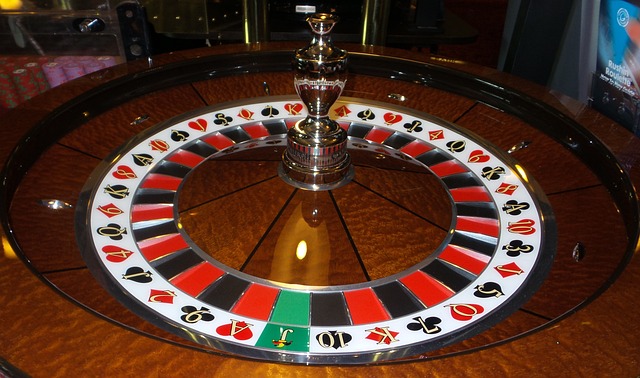Roulette, a captivating casino game, blends simplicity and strategy. Players predict ball landings on numbers or colors at a table with 0-36 red/black numbered pockets. Strategic betting involves understanding probabilities and unique bet types to maximize payouts. From straight bets to more complex combinations, diverse wagering options make Roulette accessible for casual and expert players alike.
Roulette, with its spinning wheels and numbered pockets, captivates players worldwide. This article delves into the heart of this thrilling game, breaking down its fundamentals for new players. We explore various types of bets and unravel the complexities of odds and probabilities.
Beyond the basics, discover proven roulette strategies like the Martingale, Fibonacci, Paroli, and Labouchere systems, each offering unique approaches to enhance your gameplay. Learn advanced techniques for tilt management, bankroll control, and understanding the nuances between live and online roulette—all essential tools in your quest to master this iconic game.
Understanding Roulette Basics

Roulette is a classic casino game that has captivated players for centuries, with its simple rules yet complex strategies. Understanding the basics is crucial before diving into advanced techniques. The objective is to predict which number or color a spinning ball will land on after it hits a rotating wheel. Players can bet on individual numbers, groups of numbers, colors (red or black), or specific bet types like even/odd. The game offers various betting options, each with different odds and potential payouts, making strategic choices essential for maximizing winnings.
Knowing the layout of the Roulette table is key to success. Numbers 0 to 36 are arranged in a circular pattern, alternating between red and black. The croupier spins the wheel while dropping a small ball on it, and players can place their bets before each spin. As the ball determines the winner, placing wise bets requires knowledge of probabilities and understanding how different bet types contribute to these odds.
– Definition and gameplay overview

Roulette is a classic casino game that involves a spinning wheel with numbered pockets and a small ball. Players bet on numbers, colors (red or black), or combinations, aiming to predict where the ball will land after each spin. The gameplay begins by placing bets on the desired outcomes, then the dealer spins the wheel in one direction while dropping the ball from a metal cage in the opposite direction. As the wheel slows down, the ball eventually comes to rest in one of the pockets, determining the winning numbers and payouts. Roulette combines elements of chance and strategy, making it an exciting game for both casual players and seasoned casino enthusiasts.
– Types of bets in roulette

Roulette offers a variety of bet types, each with its own level of risk and potential reward. The most common bets include straight bets, where players wager on a single number, and split bets, covering two adjacent numbers. Street bets target three horizontal numbers, while corner bets cover four specific numbers that form a square. For more complex plays, there are sixline (six numbers) and carré (four consecutive numbers) bets.
Additionally, players can engage in outside bets, such as red/black, odd/even, or high/low, which have higher odds but lower payouts. Understanding these bet types is essential for developing an effective roulette strategy.
Roulette remains a captivating game, offering both excitement and challenges. Understanding the basics, familiarizing yourself with bet types, and employing strategic thinking can enhance your experience. While no strategy guarantees wins, making informed decisions and managing your bankroll can contribute to a more enjoyable and potentially rewarding roulette journey in the world of gambling.






